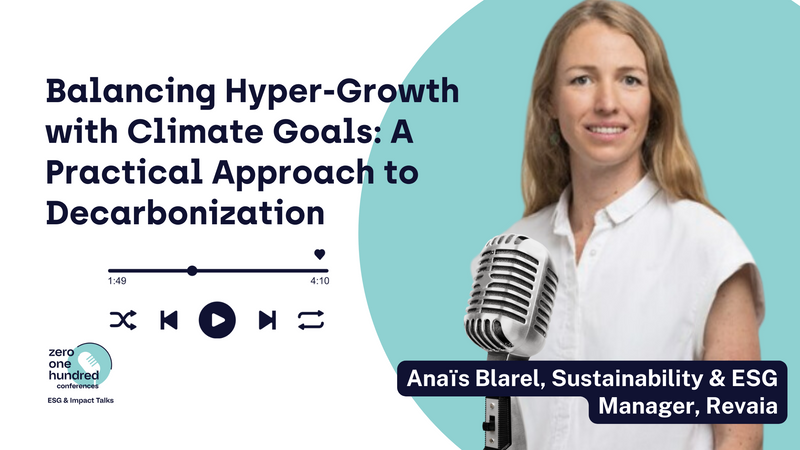In this episode of ESG & Impact talks, we had the pleasure of hosting Anaïs Blarel, Sustainability & ESG Manager at Revaia. Before joining the venture capital world, Anaïs spent 12 years developing startups across France and internationally, working at companies like Vinted, Rocket Internet, Recommerce, and VeryChic. Anaïs joined Revaia three years ago, bringing a wealth of experience in growth, product, and data.
In recent years, she has focused on impact-driven models, specializing in ESG and non-financial performance. At Revaia, she works closely with investors, supporting them in analyzing sustainability and impact performance and mitigating ESG risks. She also helps portfolio companies craft growth strategies aligned with ESG and sustainable development goals, while implementing robust methods for measuring social and environmental impact.

Before we go straight to the reason for our conversation—the climate guide—could you give us a brief introduction to what Revaia is as a fund?
Yeah, sure. Revaia is a growth equity investment firm. We are a pan-European firm spanning Paris, London, and Berlin. We manage close to 500 million euros in assets under management and are about to close a second fund, Revaia Growth 2.
We invest in generalist tech—everything from fintech to climate tech, through HR tech, for example. Our tickets typically range from 5 to 20 million euros, and we often lead or co-lead investments. As a result, we frequently hold representation on company boards.
The goal is really to invest in the next generation of sustainable champions in Europe.
In this short period, Revaia has grown significantly for a young fund. What do you think has driven your success, especially in terms of size? Also, you’re trying to set benchmarks for the industry with your climate guide—can you elaborate on that?
Absolutely. Going back to your first question, I think Revaia’s fast and successful development can be attributed to addressing two critical gaps at the time of our founding, five years ago:
The lack of late-stage VC investment funds in Europe. Many European scale-ups were being funded by American or Asian firms. We saw a clear need for European late-stage investment firms to compete globally.
ESG at the core. From the start, Revaia embedded ESG into its DNA—even before SFDR (the European regulation) came into force.
Regarding the climate guide, it came from conversations with fellow ESG and climate professionals. Many found it challenging to implement climate targets or pathways due to the complexity of existing frameworks.
In our introductory survey, we found that only 22% of venture and growth investors in Europe had implemented climate targets. So, we set out to create a practical and accessible guide to simplify decarbonization frameworks and provide an actionable roadmap. The goal was to reduce barriers to entry and accelerate the adoption of climate strategies across the industry, driving collective progress in sustainable technology.
Why do you think decarbonization is such a critical issue for venture capital and growth equity firms? How can these firms influence global sustainability efforts?
Venture capital and growth equity investors are at the forefront of technologies shaping the future economy. Our close proximity to the real economy and our portfolio companies allows us to support and accelerate their sustainable initiatives.
As tech investors, we have a unique responsibility. The tech industry is both a significant contributor to climate change and a source of innovative solutions. For instance, big tech companies have seen emissions rise due to AI activities—Google’s emissions increased by 50% in just four years.
Our responsibility is to back companies that integrate decarbonization from inception and use AI responsibly, considering both environmental and social impacts. It’s not just about sustainability; it’s about ensuring long-term economic viability for these companies.
Revaia launched as an ESG-oriented fund in 2019. Why did you prioritize ESG before it became a widespread focus?
We weren’t the first, but ESG-focused funds were very marginal at the time. Impact funds were small, and traditional funds only touched on aspects like data protection or diversity.
In 2020, even before SFDR, Revaia published the Tech for Good Charter and the Investing Responsibly in Tech Guide, outlining what it means to be a responsible tech investor. This proactive approach has set us apart.
How do you balance the growth trajectories of hyper-growth startups with climate goals, especially when applying decarbonization strategies?
Balancing growth and climate goals is challenging, particularly because existing frameworks weren’t designed for growing companies. For example, frameworks like SBTI require linear reductions in emissions, which is impractical for startups rapidly scaling their teams or offices.
Instead, we focus on intensity ratios—emissions per employee or per thousand euros of revenue. This pragmatic approach allows companies to grow while still aligning with decarbonization goals.
How do you address challenges with data reliability when it comes to ESG reporting?
Reliable data is the holy grail of ESG and private equity. While granular carbon footprint assessments are ideal, they are often too resource-intensive for early-stage companies.
To address this, we provide techniques for estimating emissions using peer data or proxies. Sometimes, focusing on common-sense initiatives is more impactful than attempting exhaustive data collection.
Finally, what has been the industry response to your climate guide?
The feedback has been overwhelmingly positive. Peers have praised the guide for clarifying where to focus resources and how to take meaningful actions. It’s a time-saving tool that simplifies the overwhelming landscape of decarbonization frameworks, helping funds take their first steps toward sustainability.

